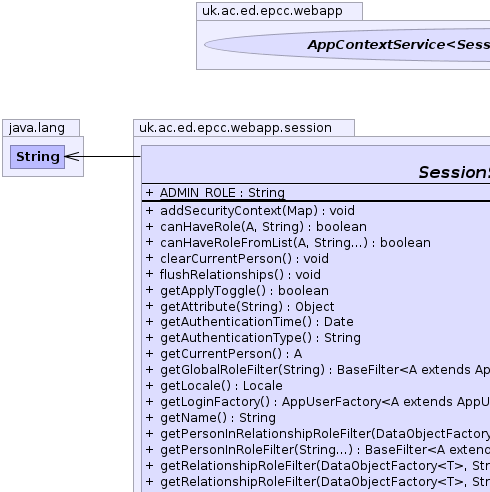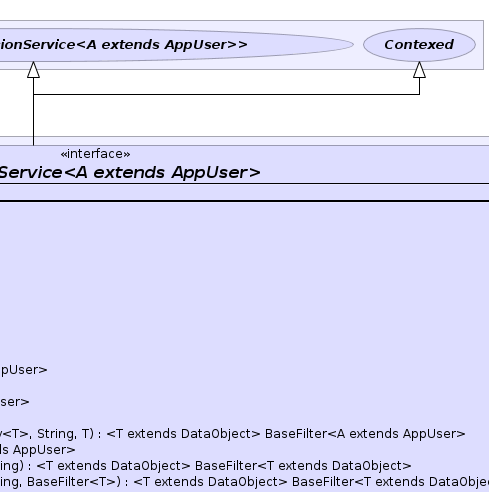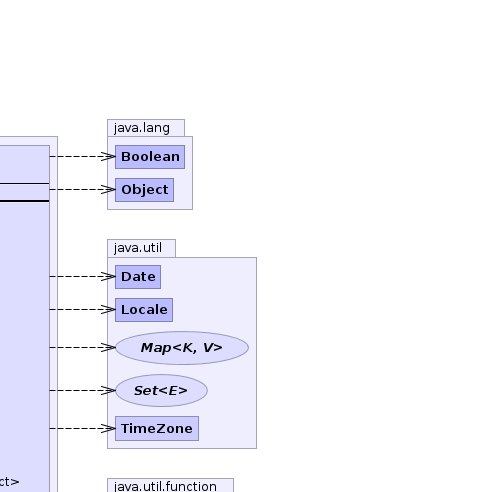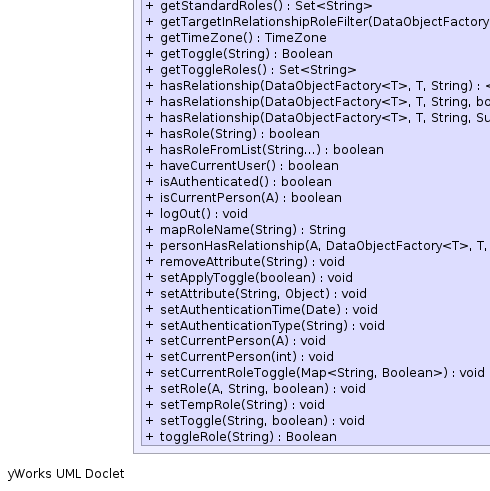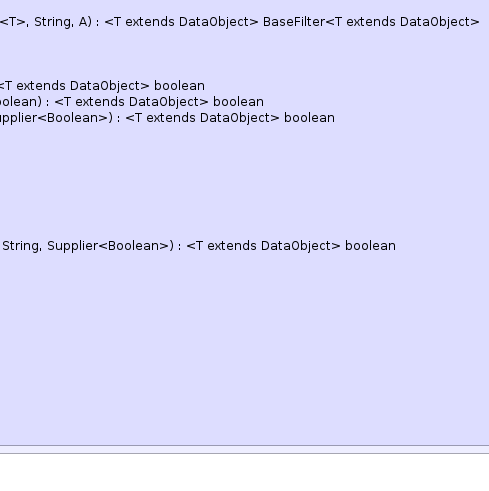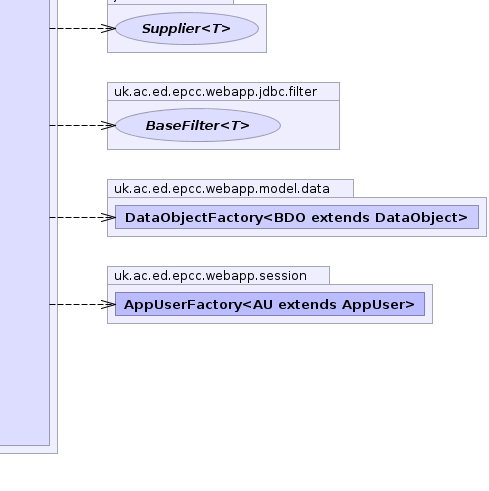-
- Type Parameters:
A- type of AppUser
- All Superinterfaces:
- AppContextCleanup, AppContextService<SessionService<A>>, Contexed
- All Known Implementing Classes:
- AbstractSessionService, ServletSessionService, SimpleSessionService
public interface SessionService<A extends AppUser> extends Contexed, AppContextService<SessionService<A>>
AppContextServicefor managing session information. This encodes all information about the current authenticated user, most importantly their roles. The users may also have a database representation as anAppUserobject which can also be stored in this service. If no database representation of the users is required then the getLoginFactory should return null but the getName and role methods can still be used.
-
-
Field Summary
Fields Modifier and Type Field and Description static java.lang.StringADMIN_ROLEDefault administrator role.
-
Method Summary
All Methods Instance Methods Abstract Methods Default Methods Modifier and Type Method and Description voidaddSecurityContext(java.util.Map att)Add context parameters for security logging.booleancanHaveRole(A user, java.lang.String role)query the default role set for the specified user.default booleancanHaveRoleFromList(A user, java.lang.String... roles)voidclearCurrentPerson()remove the current personvoidflushRelationships()clear the internal relationship cache as things may have changedbooleangetApplyToggle()are toggle roles currently enabledjava.lang.ObjectgetAttribute(java.lang.String key)retrieve an object stored in the session.java.util.DategetAuthenticationTime()If there is a current user return the time they authenticated This should only record a user-present authentication not API access via a tokenjava.lang.StringgetAuthenticationType()Get the authentication type used for the session.AgetCurrentPerson()get the current person if knownBaseFilter<A>getGlobalRoleFilter(java.lang.String role)get aBaseFilterfor allAppUsers who have access to a global role.java.util.LocalegetLocale()Get the Locale to use in the current contextAppUserFactory<A>getLoginFactory()get the concrete factory class for the AppUser used by this applicationjava.lang.StringgetName()Get the Name for the current user.<T extends DataObject>
BaseFilter<A>getPersonInRelationshipRoleFilter(DataObjectFactory<T> fac, java.lang.String role, T target)get aBaseFilterrepresenting the set ofAppUsers that are in a particular relationship-role with a target object.BaseFilter<A>getPersonInRoleFilter(java.lang.String... role_list)Get a filter forAppUsers that can be in any of the specified global roles.<T extends DataObject>
BaseFilter<T>getRelationshipRoleFilter(DataObjectFactory<T> fac, java.lang.String role)get aBaseFilterrepresenting the set of target objects that the current user has a particular relationship-role with.<T extends DataObject>
BaseFilter<T>getRelationshipRoleFilter(DataObjectFactory<T> fac, java.lang.String role, BaseFilter<T> fallback)get aBaseFilterrepresenting the set of target objects that the current user has a particular relationship-role with.java.util.Set<java.lang.String>getStandardRoles()Get the set of standard roles.<T extends DataObject>
BaseFilter<T>getTargetInRelationshipRoleFilter(DataObjectFactory<T> fac, java.lang.String role, A person)get aBaseFilterrepresenting the set of targets that a specifiedAppUseris in a particular relationship-role with.java.util.TimeZonegetTimeZone()java.lang.BooleangetToggle(java.lang.String role)get the current State of a role toggle or null if not a toggle rolejava.util.Set<java.lang.String>getToggleRoles()Get the set of toggle roles for the current user.<T extends DataObject>
booleanhasRelationship(DataObjectFactory<T> fac, T target, java.lang.String role)Method to check relationships on a specified target object.default <T extends DataObject>
booleanhasRelationship(DataObjectFactory<T> fac, T target, java.lang.String role, boolean fallback)Method to check relationships on a specified target object.<T extends DataObject>
booleanhasRelationship(DataObjectFactory<T> fac, T target, java.lang.String role, java.util.function.Supplier<java.lang.Boolean> fallback)Method to check relationships on a specified target object.booleanhasRole(java.lang.String role)Does the current user have the specified role.default booleanhasRoleFromList(java.lang.String... roles)check for membership of any of the roles in listbooleanhaveCurrentUser()Can we generate an AppUser for this session.booleanisAuthenticated()Tests if the session has already authenticated.booleanisCurrentPerson(A person)does the current session correspond to the person.voidlogOut()Clear current person and any saved statejava.lang.StringmapRoleName(java.lang.String role)Perform role-name mapping.default <T extends DataObject>
booleanpersonHasRelationship(A person, DataObjectFactory<T> fac, T target, java.lang.String role, java.util.function.Supplier<java.lang.Boolean> fallback)Convenience method to query the relationships of a specified person rather than the current user Note this will not consider global roles unless the person matches the current personvoidremoveAttribute(java.lang.String key)remove object from sessionvoidsetApplyToggle(boolean value)enable/disable the toggle checks for this sessionvoidsetAttribute(java.lang.String key, java.lang.Object value)Store an object in the session.voidsetAuthenticationTime(java.util.Date d)Set the authentication timevoidsetAuthenticationType(java.lang.String type)Set the authenticaiton type used for the session.voidsetCurrentPerson(A person)Set the current personvoidsetCurrentPerson(int id)Set the current person by idvoidsetCurrentRoleToggle(java.util.Map<java.lang.String,java.lang.Boolean> toggle_map)Remember the current role_map belonging to the current user.voidsetRole(A user, java.lang.String role, boolean value)request a role change for a specified user.voidsetTempRole(java.lang.String role)Set a temporary (not stored to database) role.voidsetToggle(java.lang.String name, boolean value)Set the toggle state of a rolejava.lang.BooleantoggleRole(java.lang.String name)Toggle the state of a role return the new value of the toggle or null if its not a togglable role-
Methods inherited from interface uk.ac.ed.epcc.webapp.Contexed
getContext
-
Methods inherited from interface uk.ac.ed.epcc.webapp.AppContextService
getType
-
Methods inherited from interface uk.ac.ed.epcc.webapp.AppContextCleanup
cleanup
-
-
-
-
Field Detail
-
ADMIN_ROLE
static final java.lang.String ADMIN_ROLE
Default administrator role.- See Also:
- Constant Field Values
-
-
Method Detail
-
getName
java.lang.String getName()
Get the Name for the current user. This method can still be used when no login factory is configured.- Returns:
- String
-
haveCurrentUser
boolean haveCurrentUser()
Can we generate an AppUser for this session.- Returns:
- true if we know the current user
-
hasRole
boolean hasRole(java.lang.String role)
Does the current user have the specified role. Always returns false if user is not known;- Parameters:
role-- Returns:
- boolean
-
getToggleRoles
java.util.Set<java.lang.String> getToggleRoles()
Get the set of toggle roles for the current user. These are roles that a user can enable/disable on request.- Returns:
- Set of role names.
-
getToggle
java.lang.Boolean getToggle(java.lang.String role)
get the current State of a role toggle or null if not a toggle role- Parameters:
role-- Returns:
- Boolean or null
-
setToggle
void setToggle(java.lang.String name, boolean value)Set the toggle state of a role- Parameters:
name- String role to setvalue- boolean value to set
-
setApplyToggle
void setApplyToggle(boolean value)
enable/disable the toggle checks for this session- Parameters:
value-
-
getApplyToggle
boolean getApplyToggle()
are toggle roles currently enabled- Returns:
-
toggleRole
java.lang.Boolean toggleRole(java.lang.String name)
Toggle the state of a role return the new value of the toggle or null if its not a togglable role- Parameters:
name- String role to toggle- Returns:
- Boolean or null
-
setCurrentRoleToggle
void setCurrentRoleToggle(java.util.Map<java.lang.String,java.lang.Boolean> toggle_map)
Remember the current role_map belonging to the current user.- Parameters:
toggle_map-
-
getCurrentPerson
A getCurrentPerson()
get the current person if known- Returns:
- AppUser or null
-
setCurrentPerson
void setCurrentPerson(A person)
Set the current person- Parameters:
person-
-
isCurrentPerson
boolean isCurrentPerson(A person)
does the current session correspond to the person.- Parameters:
person-- Returns:
- boolean
-
setCurrentPerson
void setCurrentPerson(int id)
Set the current person by id- Parameters:
id-
-
clearCurrentPerson
void clearCurrentPerson()
remove the current person
-
getAuthenticationTime
java.util.Date getAuthenticationTime()
If there is a current user return the time they authenticated This should only record a user-present authentication not API access via a token- Returns:
-
setAuthenticationTime
void setAuthenticationTime(java.util.Date d)
Set the authentication time- Parameters:
d-
-
getAuthenticationType
java.lang.String getAuthenticationType()
Get the authentication type used for the session. This should be one of "password" or a remote auth realm- Returns:
-
setAuthenticationType
void setAuthenticationType(java.lang.String type)
Set the authenticaiton type used for the session. This should be one of "password" or a remote auth realm.- Parameters:
type-
-
logOut
void logOut()
Clear current person and any saved state
-
getLoginFactory
AppUserFactory<A> getLoginFactory()
get the concrete factory class for the AppUser used by this application- Returns:
- AppUserFactory
-
hasRoleFromList
default boolean hasRoleFromList(java.lang.String... roles)
check for membership of any of the roles in list- Parameters:
role_list-- Returns:
- boolean
-
setRole
void setRole(A user, java.lang.String role, boolean value) throws java.lang.UnsupportedOperationException
request a role change for a specified user. This is an optional operation as a session service may not have the ability to modify roles.- Parameters:
user-role-value-- Throws:
java.lang.UnsupportedOperationException
-
setTempRole
void setTempRole(java.lang.String role)
Set a temporary (not stored to database) role.- Parameters:
role-
-
canHaveRole
boolean canHaveRole(A user, java.lang.String role)
query the default role set for the specified user. This only queries the roles managed directly by the session service. This method should reflect the state set by setRole and should not be used to query the current roles of the current user. No role mapping is applied- Parameters:
user-role-- Returns:
- is role permitted.
-
getGlobalRoleFilter
BaseFilter<A> getGlobalRoleFilter(java.lang.String role)
get aBaseFilterfor allAppUsers who have access to a global role. This is the same selection as {@link #canHaveRole(AppUser, String)- Parameters:
role-- Returns:
-
canHaveRoleFromList
default boolean canHaveRoleFromList(A user, java.lang.String... roles)
-
setAttribute
void setAttribute(java.lang.String key, java.lang.Object value)Store an object in the session. Objects stored in the session should not contain references to the AppContext as theAppContextmight have a shorter lifetime. t- Parameters:
key-value-
-
removeAttribute
void removeAttribute(java.lang.String key)
remove object from session- Parameters:
key-
-
getAttribute
java.lang.Object getAttribute(java.lang.String key)
retrieve an object stored in the session.- Parameters:
key-- Returns:
- Object or null
-
getLocale
java.util.Locale getLocale()
Get the Locale to use in the current context- Returns:
- Locale
-
getStandardRoles
java.util.Set<java.lang.String> getStandardRoles()
Get the set of standard roles. Used by add-role forms etc.- Returns:
-
getTimeZone
java.util.TimeZone getTimeZone()
-
mapRoleName
java.lang.String mapRoleName(java.lang.String role)
Perform role-name mapping. This allows multiple specific roles to be mapped to a single meta-role.- Parameters:
role- specific role requests- Returns:
- String actual role to use
-
getRelationshipRoleFilter
<T extends DataObject> BaseFilter<T> getRelationshipRoleFilter(DataObjectFactory<T> fac, java.lang.String role) throws UnknownRelationshipException
get aBaseFilterrepresenting the set of target objects that the current user has a particular relationship-role with.- Parameters:
fac-DataObjectFactoryfor target objectrole-- Returns:
BaseFilter- Throws:
UnknownRelationshipException
-
getRelationshipRoleFilter
<T extends DataObject> BaseFilter<T> getRelationshipRoleFilter(DataObjectFactory<T> fac, java.lang.String role, BaseFilter<T> fallback)
get aBaseFilterrepresenting the set of target objects that the current user has a particular relationship-role with. If the named relationship is defined it is used to narrow the selection of the fallback filter. Otherwise just the fallback filter is returned.- Parameters:
fac-DataObjectFactoryfor target objectrole-fallback-BaseFilterto use by default.- Returns:
BaseFilter
-
getPersonInRelationshipRoleFilter
<T extends DataObject> BaseFilter<A> getPersonInRelationshipRoleFilter(DataObjectFactory<T> fac, java.lang.String role, T target) throws UnknownRelationshipException
get aBaseFilterrepresenting the set ofAppUsers that are in a particular relationship-role with a target object. A null target selects allAppUsers that have the specified role with any target matched by the factories defaultDataObjectFactory.getDefaultRelationshipFilter().- Parameters:
fac-role-target-- Returns:
BaseFilter- Throws:
UnknownRelationshipException
-
getPersonInRoleFilter
BaseFilter<A> getPersonInRoleFilter(java.lang.String... role_list)
Get a filter forAppUsers that can be in any of the specified global roles. as defined incanHaveRoleFromList(AppUser, String...)- Parameters:
role_list-- Returns:
-
getTargetInRelationshipRoleFilter
<T extends DataObject> BaseFilter<T> getTargetInRelationshipRoleFilter(DataObjectFactory<T> fac, java.lang.String role, A person) throws UnknownRelationshipException
get aBaseFilterrepresenting the set of targets that a specifiedAppUseris in a particular relationship-role with.- Parameters:
fac-role-person-- Returns:
BaseFilter- Throws:
UnknownRelationshipException
-
hasRelationship
<T extends DataObject> boolean hasRelationship(DataObjectFactory<T> fac, T target, java.lang.String role) throws UnknownRelationshipException
Method to check relationships on a specified target object. Note thatgetRelationshipRoleFilter(DataObjectFactory, String)is sufficient for this in combination withDataObjectFactory.matches(BaseFilter, DataObject)but adding a method toSessionServicereduces code duplication and adds to possibility of caching the results.- Parameters:
fac-DataObjectFactorytarget-DataObjectto test for relationshiprole- String role to test- Returns:
- boolean true if has relationship
- Throws:
UnknownRelationshipException
-
hasRelationship
default <T extends DataObject> boolean hasRelationship(DataObjectFactory<T> fac, T target, java.lang.String role, boolean fallback)
Method to check relationships on a specified target object.- Parameters:
fac-DataObjectFactorytarget-DataObjectto test for relationshiprole- String role to testfallback- boolean value to use if relationship undefined- Returns:
- boolean true if has relationship
-
hasRelationship
<T extends DataObject> boolean hasRelationship(DataObjectFactory<T> fac, T target, java.lang.String role, java.util.function.Supplier<java.lang.Boolean> fallback)
Method to check relationships on a specified target object.- Parameters:
fac-DataObjectFactorytarget-DataObjectto test for relationshiprole- String role to testfallback-Suppliervalue to use if relationship undefined- Returns:
- boolean true if has relationship
-
personHasRelationship
default <T extends DataObject> boolean personHasRelationship(A person, DataObjectFactory<T> fac, T target, java.lang.String role, java.util.function.Supplier<java.lang.Boolean> fallback)
Convenience method to query the relationships of a specified person rather than the current user Note this will not consider global roles unless the person matches the current person- Type Parameters:
T-- Parameters:
person-fac-target-role-fallback-- Returns:
-
isAuthenticated
boolean isAuthenticated()
Tests if the session has already authenticated. This can return false even ifhaveCurrentUser()could return true provided it is called first.
-
flushRelationships
void flushRelationships()
clear the internal relationship cache as things may have changed
-
addSecurityContext
void addSecurityContext(java.util.Map att)
Add context parameters for security logging.- Parameters:
att-
-
-
